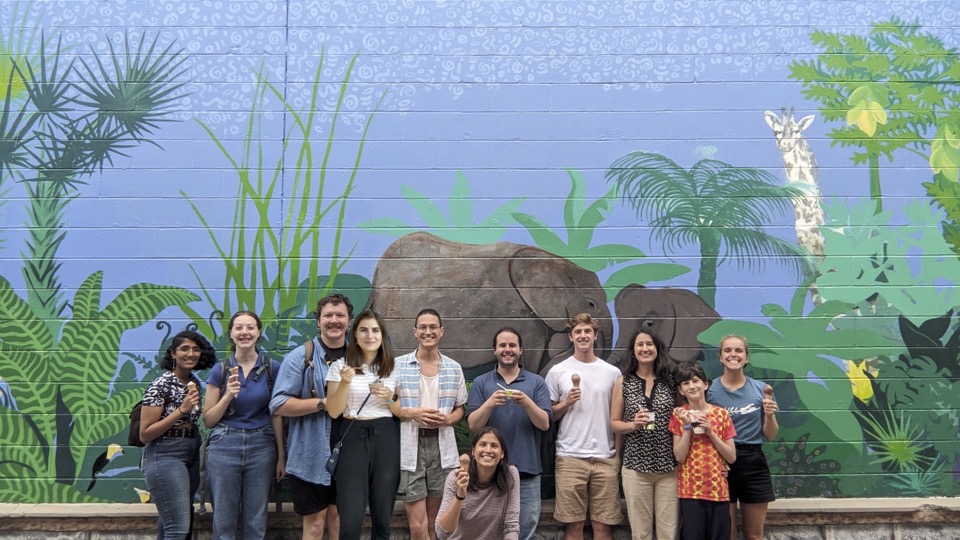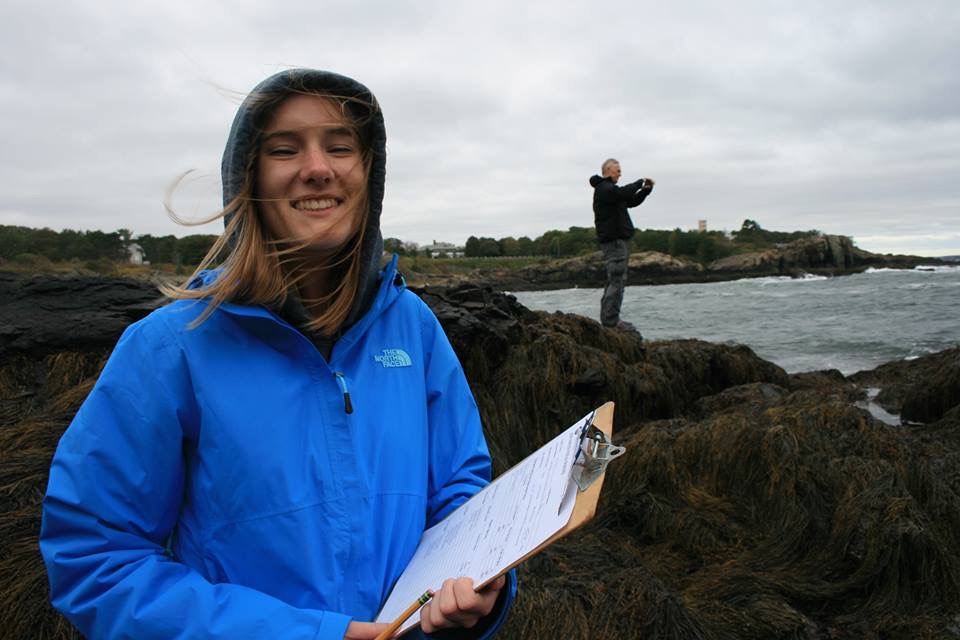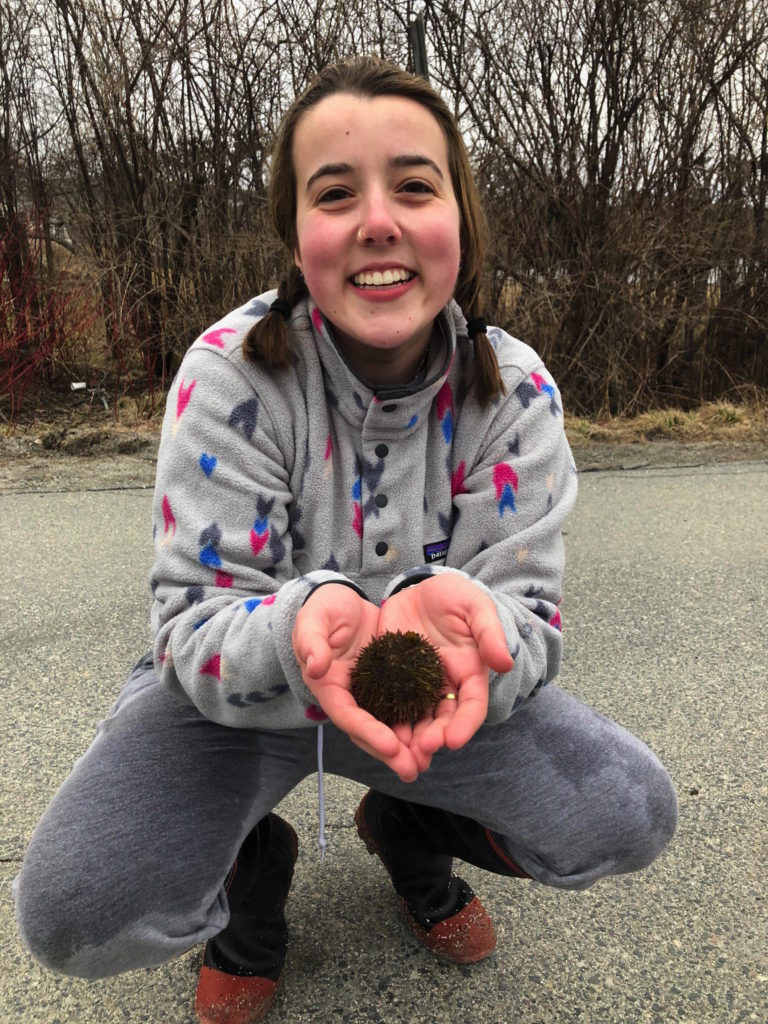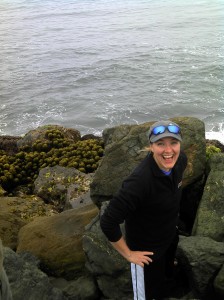Pespeni Lab Photo – Summer 2023
(With a little editing magic by Alison to add Csenge, who was in the UK doing her QuEST internship this summer!)
Principal Investigator
Melissa H. Pespeni

Melissa is an evolutionary biologist interested in identifying the molecular underpinnings of complex adaptive phenotypes and understanding how ecological and evolutionary processes interact to shape a species’ or population’s capacity to adapt to current and future biotic and abiotic challenges. Her research involves genomic and physiological analyses in both natural and experimental populations. Read more about her personal story here.
Postdoctoral Fellows
Matthew Sasaki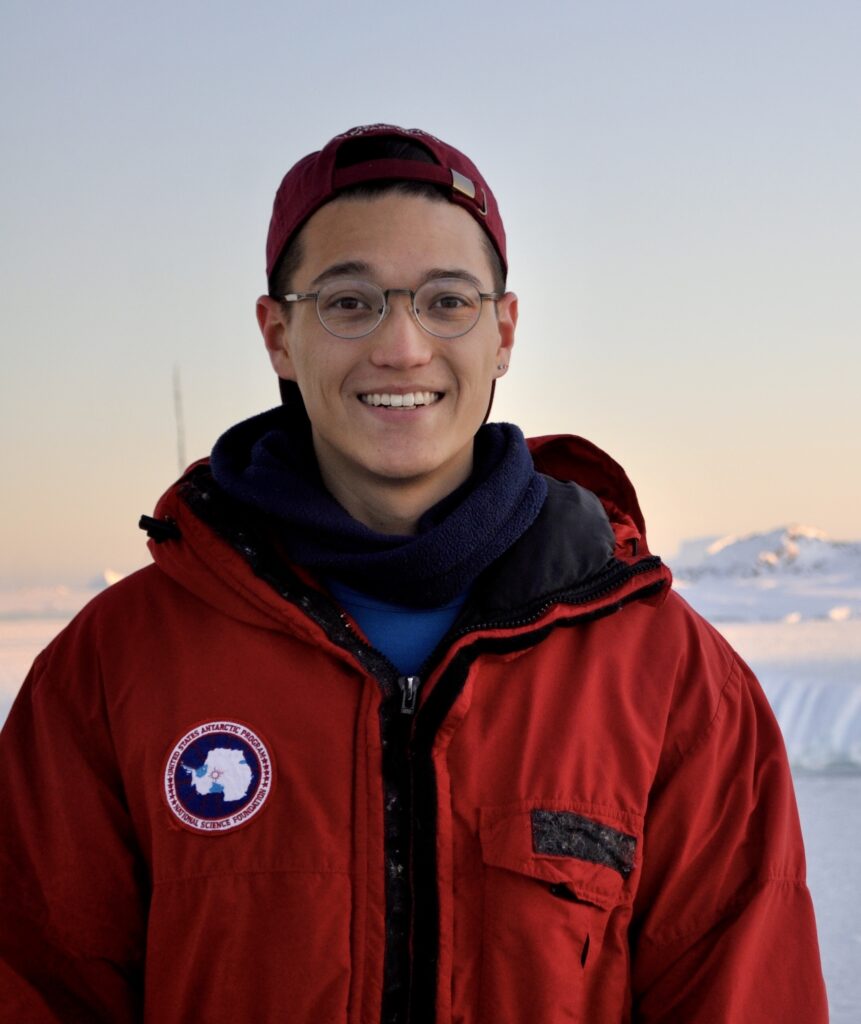
Matthew is an oceanographer and evolutionary ecologist. Working primarily with marine copepods, his work combines field observations and laboratory experiments to examine the mechanisms that shape spatial and temporal patterns in thermal adaptation. As an NSF Ocean Sciences postdoctoral fellow, he is working with the Pespeni Lab on a project comparing the genomic bases of seasonal and latitudinal patterns in thermal adaptation.
Personal website and Google Scholar.
Emily Longman
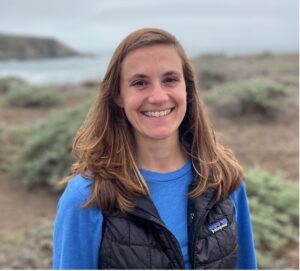 Emily is a marine biologist and evolutionary ecologist. Her research uses field and laboratory experiments to understand patterns of adaptation and community change in rocky shore ecosystems. For her NSF Ocean Sciences postdoctoral fellowship in the Pespeni Lab, she is drilling into the ecological genomics of adaptation in a non-model predatory dogwhelk system.
Emily is a marine biologist and evolutionary ecologist. Her research uses field and laboratory experiments to understand patterns of adaptation and community change in rocky shore ecosystems. For her NSF Ocean Sciences postdoctoral fellowship in the Pespeni Lab, she is drilling into the ecological genomics of adaptation in a non-model predatory dogwhelk system.
Graduate Students
Alison Hall
Alison is a PhD candidate and NSF QuEST fellow interested in understanding the evolutionary mechanisms that underlie adaptation to climate change in marine ecosystems. She is excited to use genetic and genomic tools to conserve biodiversity and understand broader ecological implications of adaptation. Outside the lab, Alison enjoys playing in the beautiful East coast outdoors.
Csenge Petak
Csenge is a PhD candidate NSF QuEST fellow interested in molecular evolutionary biology and computational modeling. She is exploring the structure and function of sea urchin gene regulatory networks to infer their evolution and how they might facilitate evolvability. As a trainee in the QuEST graduate training program, she is planning to participate in interdisciplinary research regarding the general behavior of systems and the emergence of modularity.
Andrew McCracken
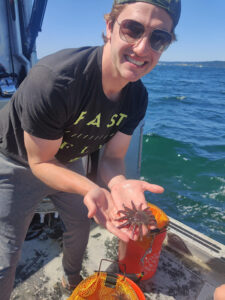
Andrew is a PhD candidate, NSF GRFP and BilDS (formally QuEST) fellow interested in understanding how organisms respond and adapt to disease outbreaks, particularly in the context of globally changing biotic and abiotic conditions. He uses a combination of bioinformatics, selection experiments, and evolutionary simulations to understand the mechanisms underlying resistance, resilience, and vulnerability in wildlife diseases. He is also actively investigating the role of the microbiome in the progression Sea Star Wasting Disease.
Undergraduate Students
Chanchal Saratkar
Chanchal joined the lab in the Spring of 2023 and is a Zoology BS major interested in studying population genetics in arthropods in the context of Earth’s changing climate. Here they are doing a zooplankton tow in Lake Champlain!
Aly Rodger
Aly joined the lab in the Spring of 2023 and is a Biological Science BS major interested in genetics, ecology, and conservation of marine ecosystems. Here she is sorting copepods from Lake Champlain to assess changes in thermal tolerance across seasons.
Yuuki Real
Willow Walker
Ethan Korman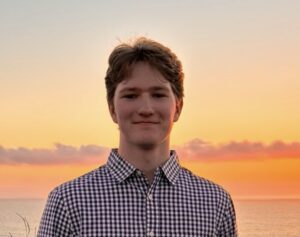
Ethan joined the lab in the Fall of 2023 and is a Biological Science BS major interested in host-pathogen and microbiome dynamics in disease, and how these interactions are affected by Earth’s changing conditions.
Alanis Papoulias
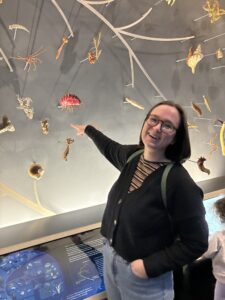 Alanis joined the lab as an intern in the Summer of 2021. In the fall of 2021, Alanis recieved the Kay Undergraduate Research Award and the Aple Research Award to pursue research examining the effects of microplastic consumption on copepod thermal tolerance. After taking some time off, Alanis returned to the lab in the Spring of 2024 to continue her research. Alanis is currently a student in the Masters of Medical Science program at UVM and plans to apply to medical school in the near future. Here she is delighted to see copepods at the natural history museum in NYC!
Alanis joined the lab as an intern in the Summer of 2021. In the fall of 2021, Alanis recieved the Kay Undergraduate Research Award and the Aple Research Award to pursue research examining the effects of microplastic consumption on copepod thermal tolerance. After taking some time off, Alanis returned to the lab in the Spring of 2024 to continue her research. Alanis is currently a student in the Masters of Medical Science program at UVM and plans to apply to medical school in the near future. Here she is delighted to see copepods at the natural history museum in NYC!
And YOU?!
If you are a highly motivated and dedicated undergraduate interested in our research, please read, fill out, and send this application to Dr. Pespeni with an introduction to your motivations! The typical flow is to first become familiar with the organisms and types of research questions addressed and tools used in the lab. To do this, you would assist with current research projects and attend weekly lab meetings. If you are particularly attentive to detail and compassionate, you can shadow current lab assistants to learn the ropes to become an animal care technician. After on average a year in the lab doing the above activities, you may feel confident in designing and carrying out your own research project with Dr. Pespeni’s guidance.
Pespeni Lab alum:
Manali Rege-Colt
Joining the lab first as an undergraduate researcher and then as a lab technician, Manali worked to support the lab’s research on the evolutionary mechanisms of adaptation to climate change in copepods, specifically in the context of rising ocean temperatures. Prior to this position, Manali received her MS in Biology investigating how different acoustic characteristics of habitats can effect the communication of spotted dolphins.
Jamie Cull-Host
Jaime was a summer intern 2023 and graduated with their Environmental Science degree from UVM. Originally from New Mexico, Jamie loves the outdoors, origami, reading, and of course playing with copepods!
Lauren Ashlock
Lauren earned her PhD in the lab studying the potential resilience of marine 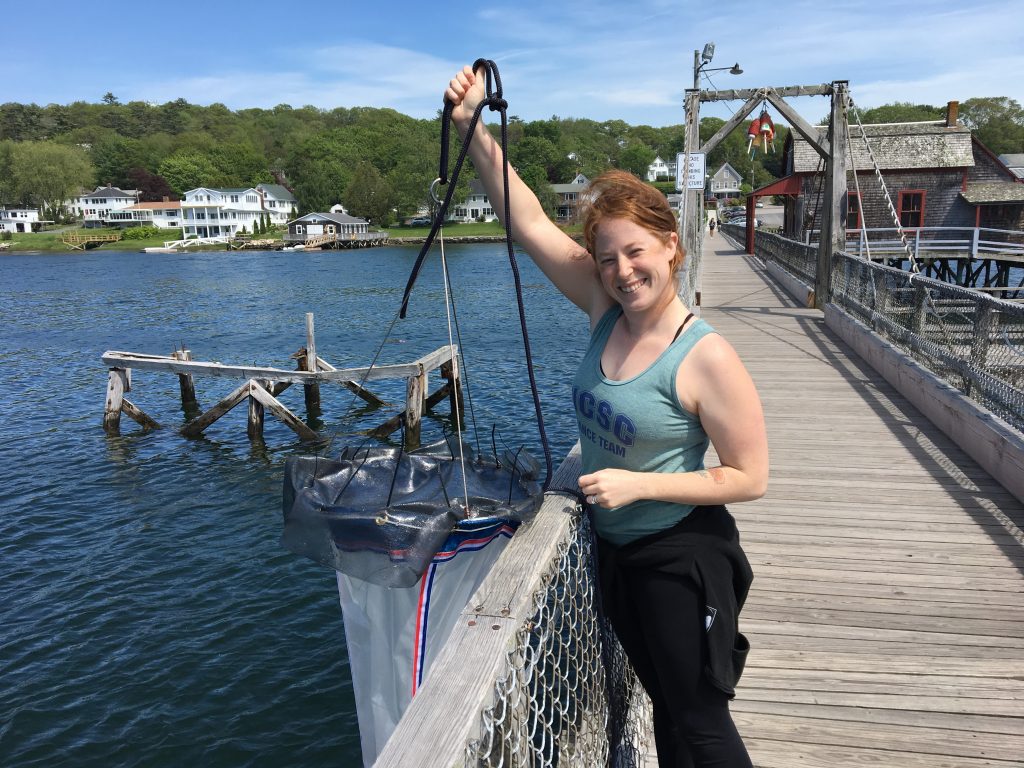 organisms to global climate change. She is presently a postdoc at Bodega Marine Lab of the University of California, Davis. For her dissertation research, she used multi-generational selection experiments in marine copepods to investigate the adaptive capacity for response to multiple and sequential biotic and abiotic stressors. As a fellow in the QuEST graduate training program, she did an applied internship at the Farallon Institute.
organisms to global climate change. She is presently a postdoc at Bodega Marine Lab of the University of California, Davis. For her dissertation research, she used multi-generational selection experiments in marine copepods to investigate the adaptive capacity for response to multiple and sequential biotic and abiotic stressors. As a fellow in the QuEST graduate training program, she did an applied internship at the Farallon Institute.
Reid Brennan

Reid was a postdoc in the lab and is now junior faculty at GEOMAR in Kiel, Germany! Reid is an evolutionary biologist interested in how organisms respond and adapt to abiotic stressors. He is particularly focused on the mechanisms that enable populations to adapt to and persist in novel environments and utilizes physiological, transcriptomic, and genomic approaches.
Personal website and Google Scholar.
Emily Shore
Emily earned her Masters in the lab as a student interested in human impacts on the environment. Her thesis explored the impacts of microplastics on the fitness and behavior of copepods.
April Garrett
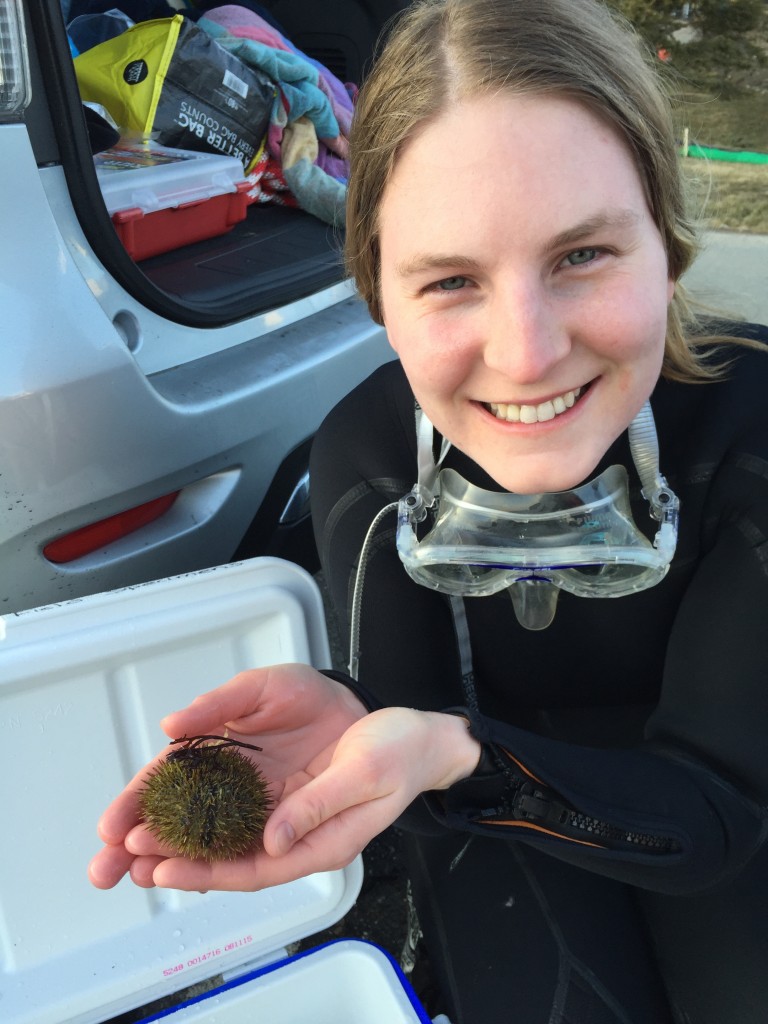 April (NSF GRFP fellow) earned her Masters in the lab for her research on how environmental stressors, particularly ocean acidification, impact the physiology and resilience of marine invertebrates.
April (NSF GRFP fellow) earned her Masters in the lab for her research on how environmental stressors, particularly ocean acidification, impact the physiology and resilience of marine invertebrates.
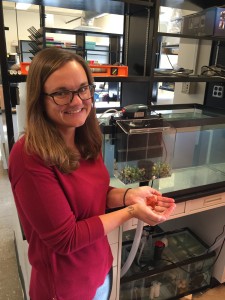 Melanie Lloyd, NSF-funded Postdoctoral Fellow
Melanie Lloyd, NSF-funded Postdoctoral Fellow
Currently: Living her dream – staying in Vermont as a high school science teacher!
Kate Huber, Zoology BS 2019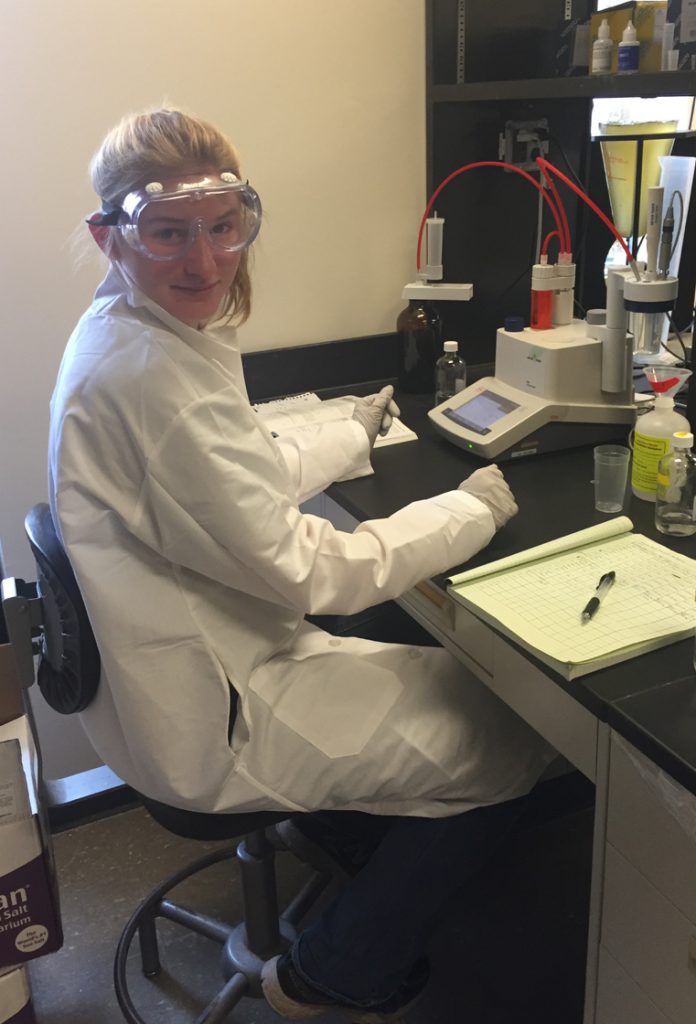
Research: Impacts of novel plastic leachate compounds on larval sea urchin development.
Currently: Starting as a Masters student in the UK studying conservation.
 Aubrey Pelletier, Biology BS 2019
Aubrey Pelletier, Biology BS 2019
Honors College thesis research: Characterized the genetic variation in carbonic anhydrase, a protein critical for resilient physiological phenotypes in ocean acidification conditions.
Currently: Marine research technician in Indonesia!
 Becky Nesnevich, Zoology BS 2018
Becky Nesnevich, Zoology BS 2018
Honors College thesis research: Tested for differences in microbial communities between five different tissues of healthy and sick sea stars affected with Sea Star Wasting Disease.
Currently: Fisheries catch inspector on ships off the coast of Massachusetts.
Chelsea Darwin, Biological Sciences BS 2020
Her thesis explored the adaptability of the marine copepods to different environmental stressors such as changes in temperature and salinity.
Anya Steinhart, Biology BA 2020
Anya’s research explored the genetic and physiological response mechanisms of the tropical sea urchin Lytechinus variegatus to extreme low salinity events, mimicking tropical storms.
